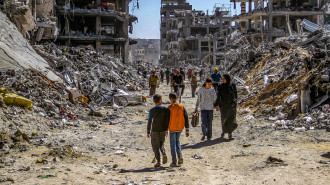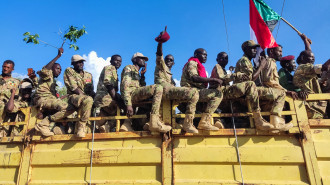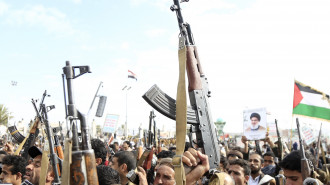The
massacre of over 1,000 people by Egyptian security forces at Cairo's Rabaa Square in 2013 marked a dark defining point for human rights in Egypt. It also marked the start of a vacuum in justice leading to unchecked state violence ever since.
Not a single person has been held accountable for the mass killing of the hundreds of demonstrators who attended sit-in protests against the 3 July military coup of Mohamed Morsi.
Instead, President Abdel Fattah al-Sisi's regime has led a bitter campaign against political dissidents, detaining thousands and sentencing hundreds to death in mass trials.
Journalists, photographers, human rights activists, and Muslim Brotherhood supporters have been systematically purged in a bid to suppress the
legacy of Rabaa, and maintain power.
"President Abdel Fattah al-Sisi's regime has been determined to wipe out all memory of the massacre of the summer of 2013," Najia Bounaim, North Africa campaigns director at Amnesty International, said in a report.
"The Rabaa dispersal marks a defining turning point for human rights in Egypt."
The disappeared
In the years following the massacre,
security forces have carried out forced disappearances and extrajudicial executions on a scale "never seen before", Amnesty says.
Since 2015, at least 1,700 people have been "disappeared" by state agents for periods ranging from a few days to seven months. Many have never been seen again.
Most victims are kidnapped from the streets or their homes and held incommunicado, often in National Security Agency's offices in Lazoughly, where they are cut off from their families and lawyers.
|
 |
Sisi's regime has been determined to wipe out all memory of the massacre of the summer of 2013 |
 |
|
A report last year by Amnesty suggested that as many as three to four people were disappearing
every day, with the victims as young as 14-years-old.
Families and survivors report the routine use of torture by security agents, including rape, electric shocks, and beatings to coerce confessions.
Islam Khalil, 26, who was held for 122 days by state forces, told Amnesty that at one point he was told: "Do you think that you have a price? We can kill you and put you in a blanket and throw you in any trash bin and no one will ask about you."
A generation in jail
Since the Rabaa Massacre, Egyptian authorities have led a brutal crackdown on political dissidents, rounding up thousands and sentencing hundreds to life in prison, or death, in grossly unfair mass trials.
Human rights groups estimate that as many as
60,000 political prisoners languish in Egyptian jails, significantly more than under Hosni Mubarak's dictatorship.
Muslim Brotherhood members and alleged supporters of Morsi are though to constitute the largest number, but the mass detentions also include journalists, leftists, human rights activists - basically anyone who speaks out against Sisi.
Some
13 new prisons have reportedly been built to accommodate the relentless number of detentions.
At least 1,231 people detained are being prosecuted collectively over the alleged killing of six security officers during the Rabaa Massacre, including Mahmoud Abu Zeid - or "Shawkan" - who was arrested for taking photos at the sit-in.
In another case, 494 people arrested at Cairo's al-Fateh Mosque in August 2013 are being tried together and have been held since their arrest.
The mass trials of those arrested are based on scant or dubious evidence.
In 2014, Egypt's interior ministry said over 7,000 people were being held in pre-trial detention, but that number is thought to be significantly higher.
"The level of disparity between the rampant impunity enjoyed by security forces who took part in the Rabaa dispersal on one hand, and the mass persecution of Muslim Brotherhood supporters who participated in protest as well as journalists reporting that day, is shocking," Amnesty said.
Despite the brutal levels of violence carried out by Egyptian state forces since Rabaa, EU member states have continued to supply arms and police equipment to the country.
The latest EU country report on Egypt published in July made no mention at all of abuses by security forces - much less the Rabaa Massacre.







 Follow the Middle East's top stories in English at The New Arab on Google News
Follow the Middle East's top stories in English at The New Arab on Google News


